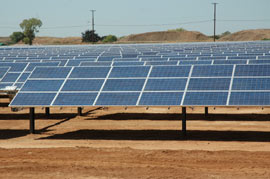Dumping complaints filed with EU against Chinese PV imports
 Following SolarWorld Americas-backed Coalition for Affordable Solar Manufacturing’s success with anti-dumping tariffs in the U.S., its parent, German company SolarWorld has led the EU ProSun group to file similar charges with the European Union. The coalition of manufacturers allege in the complaint that Chinese photovoltaic manufacturers are offering their PV cells and modules at costs below their manufacturing costs despite their losses.
Following SolarWorld Americas-backed Coalition for Affordable Solar Manufacturing’s success with anti-dumping tariffs in the U.S., its parent, German company SolarWorld has led the EU ProSun group to file similar charges with the European Union. The coalition of manufacturers allege in the complaint that Chinese photovoltaic manufacturers are offering their PV cells and modules at costs below their manufacturing costs despite their losses.
While CASM supported the filing, the Coalition for Affordable Solar Energy (CASE), which has opposed CASM’s efforts in the U.S. also is opposing them in Europe. “SolarWorld has once again demonstrated that it is willing to undermine the world’s solar industry in a desperate effort to avoid competition in the marketplace,” the organization said in a statement. “Like a crazed agent provocateur, SolarWorld is fueling global solar industry infighting for its own selfish interest.” CASE wants the E.U. to reject the action.
The allegations in the U.S. have thus far stuck, with a preliminary ruling by the Commerce Department that imposed two sets of sanctions on Chinese imports. The tariffs were imposed for certain companies at different levels. The SEC imposed both countervailing duties, which were much lower, and tariffs as high as 249.96 percent for Chinese PV manufacturers that did not participate in the case. Other companies had lower tariffs, among them Trina (31.14 percent), Suntech (31.22 percent and 31.18 percent for others that participated.
While the complaint in Europe was anticipated, at least one analyst doesn’t expect any resulting sanctions to be as high as in the U.S. “The implications of E.U. dumping are much more serious than the US case because of substantially higher volumes’ in Europe. However the case is harder to win given the E.U. rules around WTO [i.e., World Trade Organization] law,” Jefferies & Company, Inc. Equity Analyst Jesse Pichel wrote in a research note. “We believe the final implementation of a duty is likely higher than Street expectations however, the size is likely to be much smaller than in the U.S.; so the issue maybe not if, but how much,” he said.
Still, the actions aren’t likely to change how China subsidizes it’s solar industry, Pichel said via email. “I think governments will continue to encourage manufacturing businesses.” He added, “I don’t question China’s intent to subsidize its industry, the bigger question is why don’t we (the USA)?”
Still the threat alone of more sanctions is likely to impact China’s solar industry. “It will kill the companies,” Pichel said. There’s not enough demand in places like India, Africa and the Middle East to offset losing ground in the European market because of the threat of tariffs.



